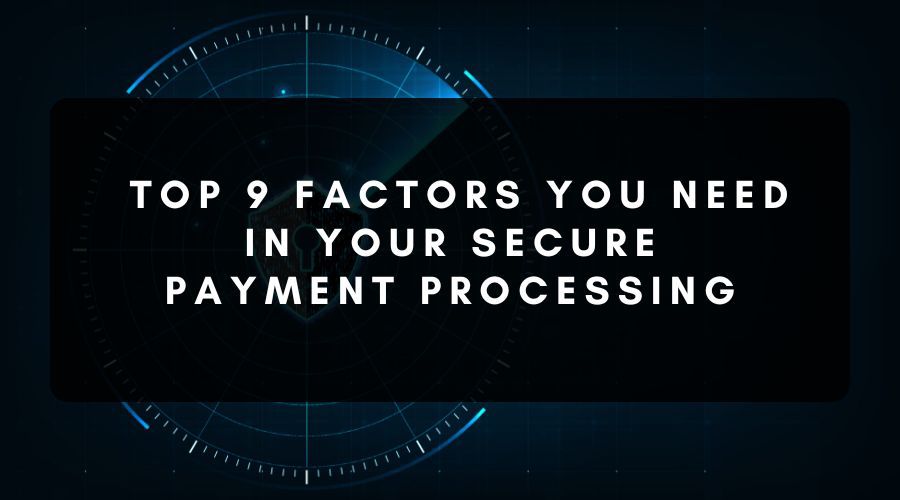9 Keys to Secure Payment Processing

For businesses that accept payments by debit or credit card, secure payment processing is critical. A single data breach could cost you millions of Euros in fines, plus your business’s reputation.
From the outset, the key to keeping your business safe is to partner with a payment processor that offers a compliant and secure payment system, uses the latest fraud prevention measures and provides mechanisms for employees to report insider theft.
PCI-DSS Compliance
A secure payment processing provider will typically use Level 1 PCI compliance, which means that they exceed the level of security required by the Payment Card Industry Data Security Standards. To further protect merchants, secure payment services providers keep card data off the merchant’s system so that the legal burden of PCI compliance falls entirely onto the payment processor.
Local Regulatory Compliance
Different countries and world regions have established regulations to protect the privacy and safety of consumers who interact and shop online. For example, Europe has established the General Data Protection Regulation, the E-Commerce Directive and the Payment Services Directive 2. The United States has the Electronic Funds Transfer Act and a section in the Treasury Financial Manual (TFM), Part 5, Chapter 7000 entitled “Credit and Debit Card Collection Transactions”. Providers of secure payment systems will ensure compliance with the relevant regulations in every country where your business operates.
End-to-End Encryption
To protect customer data, every secure payment processing provider encrypts incoming and ongoing information so that it can only be seen by the parties at either end. You know a provider uses end-to-end encryption if they have a secure sockets layer certificate (SSL certificate) or transport layer security certificate (TLS certificate), which is the updated version of SSL.
Tokenisation of Card Data
For even greater security, secure payment providers replace each customer’s card details with a randomly generated token which is sent through the payment gateway instead of the actual card number. The actual numbers and card verification values provided for one-time and recurring payments are stored in a secure vault inside the gateway.
Dynamic Fraud Scrub
E-commerce fraud is expected to cost merchants €44 billion globally in 2023. To keep you protected, a secure payment system will offer dynamic, customisable and adjustable fraud protection algorithms as part of its merchant services package so that you can quickly identify suspicious transactions and let genuine transactions through.
Chargeback Prevention
Credit card chargebacks aren’t always the result of fraud, but they can cost merchants valuable time and money. To protect your business, a secure payment processing solutions provider should offer tools that block chargeback requests before they go through so that you can either contest the chargeback or resolve any issues with the customer directly.
Strong Customer Authentication Measures
At the checkout itself, there are several features that secure payment systems use to authenticate genuine customers and recognise and block (or flag) credit card payments that might be fraudulent.
- Strong password requirements (a letter, a number, a punctuation mark and a pre-specified minimum length)
- Two-factor authentication
- Address verification service (AVS) for credit card processing
- Card verification value (CVV)
- Reverse lookups to match the customer’s internet provider address (IP address), billing address, email address, phone number and other identifying details
- Automatic requests for customers to contact you to confirm their orders if any details are returned as suspicious based on your pre-set rules
The more of these features that you implement, the more secure your checkout process will be. In turn, greater security increases customer trust and protects your bottom line.
Employee Training
Secure payment processing providers routinely train their employees on best practices regarding payment security, restrict access to sensitive payment information and impose hefty penalties for data breaches and unauthorised access or theft.
In 2018, U.S. businesses lost around 5% of their annual revenue to employee fraud or collusions between employees and third parties, so when offering a secure payment system, make sure that your provider has clear employee training and penalties in place as well as a system through which employees can safely report in-house fraud.
Multiple Merchant Accounts
To ensure uninterrupted payment processing, international merchant account providers can spread the payment processing load across several merchant accounts with acquiring banks in different countries. Different financial institutions have varying policies regarding certain industries, and spreading the load ensures that high-risk merchants can always continue to process payments.
Protect Your Revenue with a Secure Payment Processing Provider
Your business revenue is your livelihood, and everything you do to protect your revenue is an investment in your business’s long-term success.
When choosing a payment processor, look for one that ticks all of the boxes as far as security is concerned and has a proven track record with secure payment processing. Even if it costs a bit more, you’ll know that your business and your customers’ data are in the best of hands.
